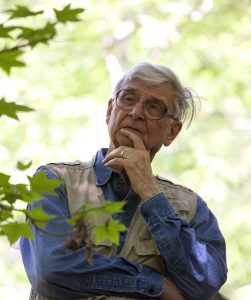
Dr. E.O. Wilson, a University of Alabama alumnus and two-time Pulitzer Prize winner will visit as a scholar-in-residence with the College Sept. 11-12. Known as one of the world’s most influential scientists, Wilson is the founder of the theory of sociobiology, which proposes that human and animal behavior is shaped by evolutionary forces,and its offshoot, evolutionary psychology. He also has developed the base of modern biodiversity conservation.
Wilson will kick off the 2012-2013 Alabama Lectures on Life’s Evolution, or ALLELE, Lecture Series with his talk, “The Social Conquest of Earth” Tuesday, Sept. 11 at 7:30 p.m. in the Bryant Conference Center’s Sellers Auditorium. The lecture is free and open to the public and will be followed by a book signing.
He will also address students in the College’s Blount Undergraduate Initiative at a convocation Wednesday, Sept. 12 at 4 p.m. in Morgan Auditorium.
A native of Birmingham and childhood resident of the Gulf Coast, Wilson earned his bachelor’s and master’s degrees in biological sciences from UA. He received his doctorate from Harvard University, and he taught there for more than 40 years as the Joseph Pellegrino University Research Professor in Entomology. He now lives in Lexington, Mass.
Wilson is the author of more than 30 books, including the Pulitzer Prize-winning “The Ants” and “The Naturalist.” His next release, scheduled to debut later this year, is a profile of his boyhood hometown, “Why We Are Here: Mobile and the Spirit of a Southern City.”
Wilson is most recognized for his work in entomology – the study of insects. His lifelong passion for studying ants in particular has made him the definitive expert on the tiny creatures and on the social structures of all animals.
Wilson has been recognized with more than 100 international awards. He is a recipient of the U.S. National Medal of Science, the Crafoord Prize from the Royal Swedish Academy of Sciences; the International Prize of Biology of Japan; and the Nonino and Serono Prizes for Letters and Sciences of Italy. In 1995 he was named one of Time magazine’s 25 most influential people in America.
While on campus, Wilson will also meet with students and faculty in the Departments of Biological Sciences and Philosophy, as well as with UA administrators.